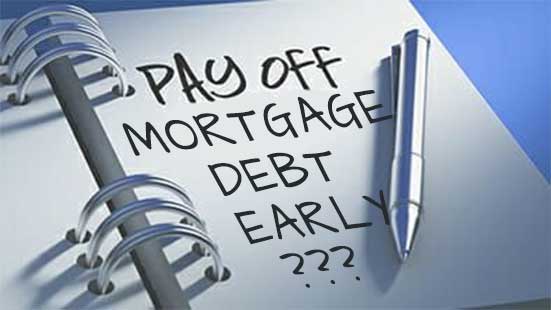
Should I Payoff My Mortgage Early
Usually the largest payment you have to make every month is your mortgage payment. Naturally, the thought of eliminating that debt payment as quickly as possible sounds very attractive to many homeowners.
Then again, the opposite side of doing so means you are putting more of your income to reduce the principal balance. The following are several reasons why paying down your mortgage balance early is not the best strategy.
Less Access to Cash
It’s understood that a lot of people have future financial goals that call for a significant amount of money. That cash could be used for kids’ college education fund, wedding arrangements, planned vacations, home makeover and buying a new car. It will be a lot more difficult to save for the aforementioned goals if your extra money goes to paying down your mortgage loan.
Unforeseen emergencies in life do occur. Nobody counts on a major car repair or major medical condition coming up. Things simply change when it comes to your car or health. When you have emergency cash set aside for reserves it is a whole lot better feeling than spending that money unnecessarily into your home’s mortgage.
In order to get back that money you’d have to sell your house, and obtain a cash-out refinance loan or a home equity loan. Each of these solutions demands time, patience and sometimes yo have to settle for a higher interest rate.
Even if you decide to pay off your mortgage early some really good advice is to save up an adequate amount of cash reserves. A healthy amount is six- to twelve- month’s worth of your house payment and normal monthly bills to deal with those costly and unforeseeable life occurrences.
Lack of Investment Income
To be in a position to pay off a mortgage prior to its original term of 30- or 15-years for most people, you will have to allocate a considerable portion of your monthly income to the principal balance. As a result, you aren’t going to able to invest that portion of your income for things that could increase your financial net worth, such as liquid investments.
According to the stock market performance over the past several years, your money would have appreciated in value from 7% to 15% if it was put into most index funds and popular individual stocks.
Furthermore, the power of investing for long periods of time could have your investments outpace inflation and real estate values which helps you build wealth a lot quicker than you would if you paid off your home loan with a low interest rate of 4- to 6-percent interest rate. Believe it or not, a large number of financial planners will strongly recommend you to add between 15% -20% of your income towards your retirement prior to even thinking about paying off your home prematurely.
A Lesser Number Of Tax Breaks
Although the long-standing mortgage interest tax deduction was diminished in 2017, homeowners are still able to deduct interest on as high as $750,000 of mortgage debt. The limit is up to $1 million for borrowers who got a mortgage prior to 2018. What many people overlook is their professional income is likely to increase as time goes by and that tax deduction could really save you money in later years.
In terms of paying less mortgage interest over the lifetime of your loan, paying off your mortgage early can offer genuine savings, but it may not be the best option for everyone. Having a financial goal such as setting up an emergency reserve fund, retirement savings account, and other major financial initiatives should be first than paying down a mortgage.
If you have any questions, get in touch with us today. We are always happy to hear from you and answer any mortgage or real estate questions that you have.

Scott is a Business Development Manager at 1stNWM. He blogs about home loans, personal finance and lives in Orange County, CA. He feels good about sharing his expertise and real world stories of successful real estate transactions. when he’s not at work, he is with his bestie, a four-legged furry and often sloberring Saint Bernard, Wyatt.